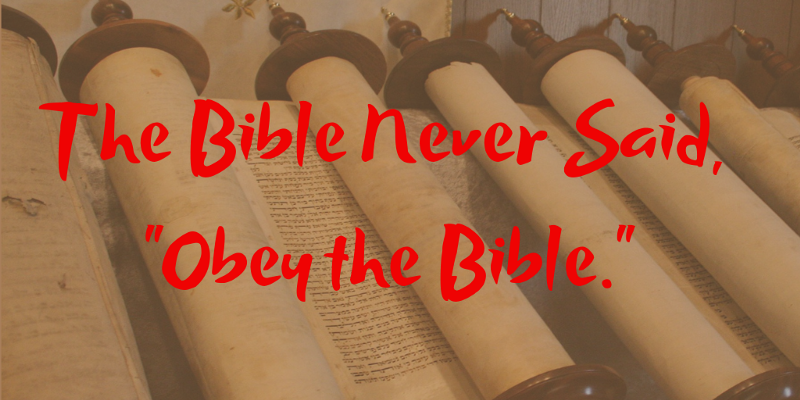Nobody obeys the Bible because nobody possesses a 100% accurate understanding of its requirements. The Bible, like every other written text in the world, requires human interpretation. Anything that requires human interpretation will eventually come under human control. Christians, Muslims, Jews all follow religious systems manufactured by human leaders from sacred texts.
When adherents give themselves without question to their religious systems, they come under the control, not of God, but of other people who will never be worthy of such allegiance. Dogmas require complete loyalty, but they can never be trusted.
The Apostle Paul held up his experience as case in point:
For you have heard of my previous way of life in Judaism, how intensely I persecuted the church of God and tried to destroy it. I was advancing in Judaism beyond many of my own age among my people and was extremely zealous for the traditions of my fathers. (Galatians 1:13-14)
As Saul of Tarsus, Paul had participated in the imprisonment and death of many innocent people under the auspices of performing God’s will. Looking remorsefully back, he named the context of his actions, “Judaism.” He used the term not to describe faithful adherence to the Torah, but rather to “the traditions of my fathers.”
Once dogma has become equated with the will of God revealed in Scripture, it’s almost impossible to escape. It becomes the lens through which we interpret all new information. Paul describes this type of blindness as a veil over the heart in 2 Corinthians 3:15, “Even to this day when Moses is read, a veil covers their (unbelieving Jews’) hearts.”
Refusal to relinquish their assumptions about the written code veiled the understanding of the Jews:
We are not like Moses, who would put a veil over his face to prevent the Israelites from seeing the end of what was passing away. But their minds were made dull, for to this day the same veil remains when the old covenant is read. It has not been removed, because only in Christ is it taken away. (2 Cor. 3:13-14)
Israel didn’t want to believe that their way of life and history as a nation had been provisional. They were “Bible based believers” who couldn’t accept that their Bible pointed away from itself to an unwritten covenant with God open to all people.
Paul knew the mind of the unbelieving Jew because he had been one until on that fateful day on the road to Damascus Christ’s pragma ran over Paul’s dogma.
I can’t help but to hear autobiographical overtones in 2 Corinthians 3 especially at the end of the chapter:
But whenever anyone turns to the Lord, the veil is taken away. Now the Lord is the Spirit, and where the Spirit of the Lord is, there is freedom. And we all, who with unveiled faces contemplate the Lord’s glory, are being transformed into his image with ever-increasing glory, which comes from the Lord, who is the Spirit. (2 Cor. 3:16-18)
Through the mystery of inspiration, God encoded images of Christ beneath the script. A superficial focus on meeting the requirements obscured the face of Christ from the Jews of Paul’s day. Once a person accepted Christ as Lord, those external requirements would be swept away to reveal the picture which had been hidden behind them all along. Far from obsolescence, the Scriptures take on a new relevance as they reveal the glory of the Lord.
Back when humans used cell phones to make and receive calls, I would occasionally play a little game with folks while leaving them a voicemail. I’d get a notification that they, having seen my missed call on their caller ID, were trying to call me back. I’d answer and say, “Hey, I’m leaving you a voicemail. Could you please hang up, so I can finish?” Sometimes they’d pause and then laugh. Other times they’d groan. One time, a lady said, “Oh, okay,” and she hung up!
Holy writ, like voicemail, was a device to aid communication between two disconnected parties. Once personal contact had been made, it would have been silly to resume the old communication method. The former aid to communication would become a hindrance to it.
Silly as that analogy may sound, it’s almost an exact description of what the Jews of Jesus’ day did when he entered their community.
Christ had superintended Israel throughout their history as the mysterious figure often referred to in the Hebrew Scriptures as “The Angel of the Lord.”¹ Jews in the first century would have been very familiar with the stories of this being who appeared as a human to wrestle with Jacob, to give marching orders to Joshua, or to talk up Gideon.
How grievous that Israel failed to recognize their divine guardian when he finally came as one of them! Listen to his lament/rebuke from John 5:39-40:
You study the Scriptures diligently because you think that in them you have eternal life. These are the very Scriptures that testify about me, yet you refuse to come to me to have life.
Scripture fulfills its ultimate purpose when we use it as an instrument to point to Christ. When we treat the text like a legal code, it will always obstruct our view of the One who is The Truth.
This applies to the edition that we call “The New Testament” as much as it does to the Hebrew Scriptures. Christ died to remove the previous media, not to replace it with an upgraded one, but so that our connection with God could be immediate (i.e. without media). According to Paul, everyone who puts their faith in the death of Christ dies to obligation to the law, so they can then go on to live for God. In Romans 7:1-6, he likens this transition to the severing of a marriage covenant by death thereby freeing one to marry another. The identity of that second spouse seems to have been lost on many who would treat the New Testament like a rule book. Notice in vs. 4-6 of Romans 7, that we didn’t die to the law to be married to the New Testament or to the teachings of the apostles. We died with Christ so that we can be married to him:
So, my brothers and sisters, you also died to the law through the body of Christ, that you might belong to another, to him who was raised from the dead, in order that we might bear fruit for God. For when we were in the realm of the flesh, the sinful passions aroused by the law were at work in us, so that we bore fruit for death. But now, by dying to what once bound us, we have been released from the law so that we serve in the new way of the Spirit, and not in the old way of the written code. (emphasis mine NAW)
Christ died to liberate his people from obligation to the Mosaic Law not because it was Mosaic but because it was law. This passage contrasts obligation to the law against union with Christ and “the old way of the written code” with “the new way of the Spirit.”
We call the Hebrew Scriptures “The Old Testament” because those thirty-nine books have become “old” when considered next to the later written revelation contained in twenty-seven books which we call “The New Testament.”
Paul never spoke of the law and the prophets as “The Old Testament.” He simply referred to the Hebrew Scriptures as “the law” or “the Scriptures,” because he had no concept of a second authoritative book. For Paul and his contemporaries, the new covenant consisted of something alive within the heart of each believer which outmoded the whole concept of religion based on an inspired text as well as everything that goes with it.
How ironic that even today, we’re so enamored with Paul’s own writings as a normative standard for faith and life that they have become the veil on our hearts keeping us from a living relationship with Christ. Paul didn’t replace the law of Moses with his own words; his words announced that it had already been replaced with grace through faith.² We struggle to understand how such ethereal things could constitute the new covenant, so we canonize Paul’s words into a new law.
By grace through faith, we’ve been brought into direct connection with God in Jesus Christ. In order to maintain that connection, we must give up our dependence on the previous media. No matter what anyone says, we mustn’t hang up to check voicemail.
Footnotes:
- I first encountered this idea in David Murray’s book, Jesus on Every Page. Thomas Nelson Publishers. P. 77-82
- Romans 6:14, Galatians 3:21-24





 I had a Taekwondo teacher who used to say that he didn’t want to hear any “yeah-but’s.” If he told a student to do something, he expected them to do it without delay or excuse. He claimed the right to unquestioning obedience by virtue of his superiority in his field.
I had a Taekwondo teacher who used to say that he didn’t want to hear any “yeah-but’s.” If he told a student to do something, he expected them to do it without delay or excuse. He claimed the right to unquestioning obedience by virtue of his superiority in his field.